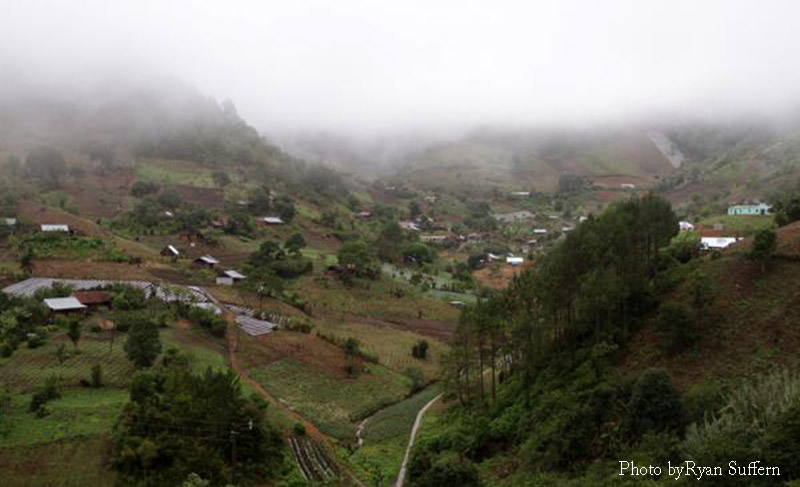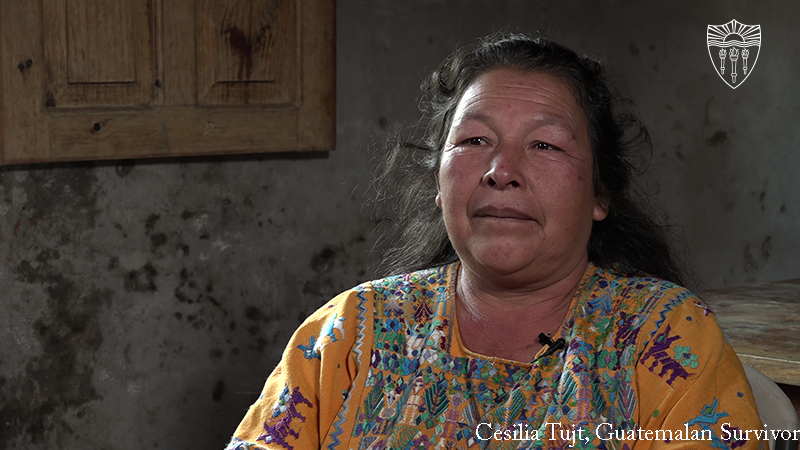Giving Voice to Guatemalan Survivors: Cesilia Tujt's Story
In 2015 , I traveled to Guatemala with a small team from USC Shoah Foundation to train staff from a local organization called the Fundación de Antropología Forence de Guatemala (FAFG) to begin collecting voices from survivors to the Guatemalan Genocide. What began as a pilot project with 10 audiovisual interviews has set in motion the gathering hundreds of testimonies from survivors of the persecution and genocide in Guatemala.
My current role with the newest testimony collection at USC Shoah Foundation is to include the Guatemalan experience in the Institute’s educational website IWitness. Additionally, I will advise and help with the glossary and indexing process of the audiovisual recordings gathered in Guatemala to be integrated into the Visual History Archive. The indexed testimonies will then be used in research and in education.
 From the first 150 completed survivors’ interviews we can gain a variety of rich descriptions of mostly Mayans experiences but also some non-indigenous lives. From discrimination and persecution during a civil war, to witness massacres and extrajudicial killings, the interviews reflect the indiscriminate violence the rural population endured. The interviewees provide insights into the context of specific developments of persecution, the process of isolation and systematic destruction that they not only experienced individually, but as a group. The first cluster of biographical narratives from Guatemala informs us about the life before the violence started. This gives a glimpse into peasant life in different regions of the western highlands of Guatemala that was later most prominently affected by the systematic violence. The testimony of survivor Cesilia Tujt is a powerful example of peasant life before and the experiences of a woman during the genocide.
From the first 150 completed survivors’ interviews we can gain a variety of rich descriptions of mostly Mayans experiences but also some non-indigenous lives. From discrimination and persecution during a civil war, to witness massacres and extrajudicial killings, the interviews reflect the indiscriminate violence the rural population endured. The interviewees provide insights into the context of specific developments of persecution, the process of isolation and systematic destruction that they not only experienced individually, but as a group. The first cluster of biographical narratives from Guatemala informs us about the life before the violence started. This gives a glimpse into peasant life in different regions of the western highlands of Guatemala that was later most prominently affected by the systematic violence. The testimony of survivor Cesilia Tujt is a powerful example of peasant life before and the experiences of a woman during the genocide.
Cesilia Tujt remembers the great time living with her grandmother until she died and Cesilia’s life thereafter changed drastically by having more responsibilities helping her mother. She recounts in her testimony.
“My mother woke me up at five in the morning and I had to make all my chores before leaving for school at nine, sometimes it took me too long and I arrived late. All my friends had started working and I felt ashamed, so sometimes I didn’t enter class anymore and told my mother that there was no school, she was happy because so I could help her all day cooking, collecting wood. I was nine years old.”

In Cesilia’s testimony and many others there is rich information about social demographics, gender roles; social and cultural changes as for example changing arrangements of marriage traditions, but also contrasting experiences about the past. Cesilia describes her intentions to hide after her husband had forcibly disappeared and she moved to her mother’s village, Tactic, in 1982, where the violence continued or in her own words worsened.
In the neighboring town, Pambach the military arrested all men, while women and children were detained in the local church. All Pambach men were killed near her town. Cesilia escaped into the mountains with others, but she was pregnant and unable to walk far, when she was arrested by the military, which incriminated her to be a guerrilla. Anyone escaping the armed forces was presumed aiding or joining the guerillas. She was raped and interrogated to force her to name people and reveal the place where guerrillas were supposedly hiding. She gave birth in the military outpost where she was detained. The nurse who assisted her delivering the baby offered her help by telling her that when the military officer returns she should tell that she is not giving her baby away. The nurse knew that only keeping her baby would preserve her life at least for the moment. The military commander insisted that she had to reveal the place of guerrilla’s hiding in the mountains, but the same day a guerilla group was captured, reason why the military released her from the outpost imprisonment. Nevertheless they obliged her go to live in an “Aldea Modelo” (village or camp under military control) saving her life.
Sexual violence was very frequent in Guatemala against civilians as a form of intimidation or torture, but also armed men invading women bodies symbolize triumph over dehumanized enemies, verifying that sexual crimes are a common weapon used in war.
Cesila’s life history is one of 150 testimonies from Guatemala that show the limited choices available for people living in regions considered “red zones” by the military. Her experience and many others recorded reveal the course of their persecution. The life stories of these testimonies document events before, during and after the war giving veracity to other existing written records or documentation, and making them very important for the past of Guatemala.